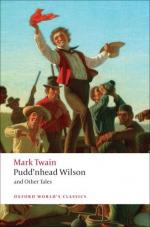The Wilsons devised a grand new thing—a fancy-dress ball. They made no actual promises, but told all their acquaintanceship in confidence that they were thinking the matter over and thought they should give it—“and if we do, you will be invited, of course.” People were surprised, and said, one to another, “Why, they are crazy, those poor Wilsons, they can’t afford it.” Several among the nineteen said privately to their husbands, “It is a good idea, we will keep still till their cheap thing is over, then we will give one that will make it sick.”
The days drifted along, and the bill of future squanderings rose higher and higher, wilder and wilder, more and more foolish and reckless. It began to look as if every member of the nineteen would not only spend his whole forty thousand dollars before receiving-day, but be actually in debt by the time he got the money. In some cases light-headed people did not stop with planning to spend, they really spent—on credit. They bought land, mortgages, farms, speculative stocks, fine clothes, horses, and various other things, paid down the bonus, and made themselves liable for the rest—at ten days. Presently the sober second thought came, and Halliday noticed that a ghastly anxiety was beginning to show up in a good many faces. Again he was puzzled, and didn’t know what to make of it. “The Wilcox kittens aren’t dead, for they weren’t born; nobody’s broken a leg; there’s no shrinkage in mother-in-laws; nothing has happened—it is an insolvable mystery.”
There was another puzzled man, too—the Rev. Mr. Burgess. For days, wherever he went, people seemed to follow him or to be watching out for him; and if he ever found himself in a retired spot, a member of the nineteen would be sure to appear, thrust an envelope privately into his hand, whisper “To be opened at the town-hall Friday evening,” then vanish away like a guilty thing. He was expecting that there might be one claimant for the sack—doubtful, however, Goodson being dead—but it never occurred to him that all this crowd might be claimants. When the great Friday came at last, he found that he had nineteen envelopes.
III.
The town-hall had never looked finer. The platform at the end of it was backed by a showy draping of flags; at intervals along the walls were festoons of flags; the gallery fronts were clothed in flags; the supporting columns were swathed in flags; all this was to impress the stranger, for he would be there in considerable force, and in a large degree he would be connected with the press. The house was full. The 412 fixed seats were occupied; also the 68 extra chairs which had been packed into the aisles; the steps of the platform were occupied; some distinguished strangers were given seats on the platform; at the horseshoe of tables which fenced the front and sides of the platform sat a strong force




